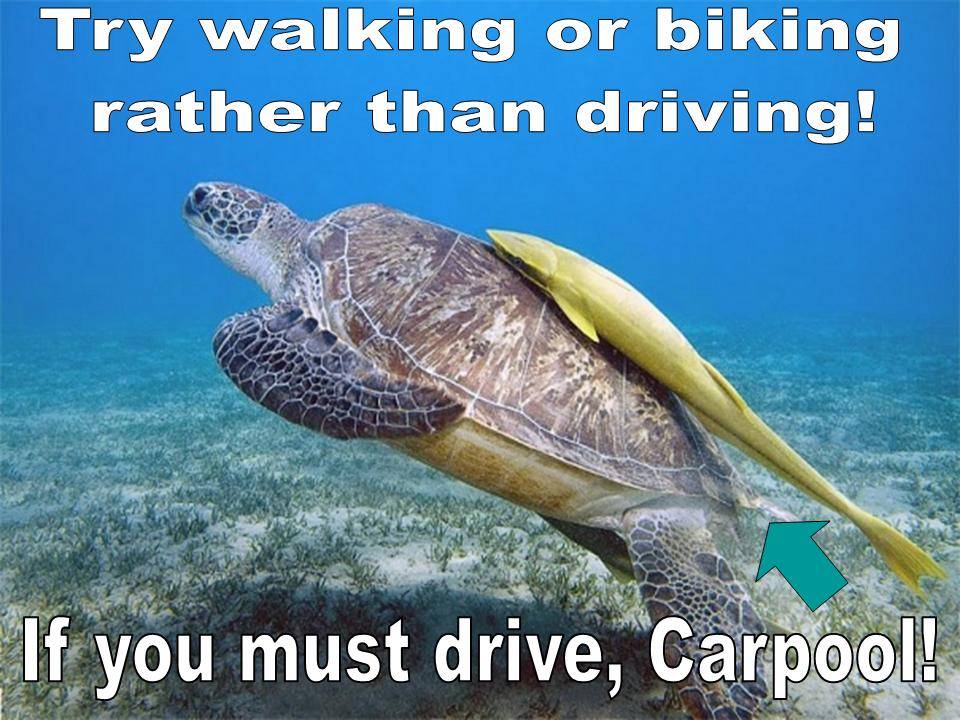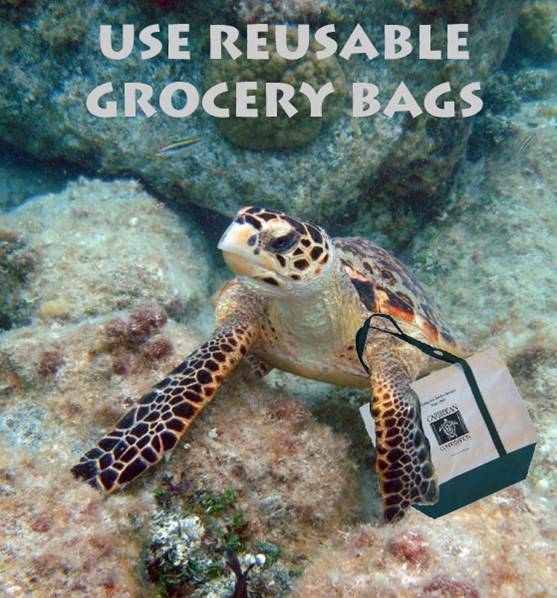Happy Earth Month! In honor of Earth Day, we’ve been sharing some awesome tips on our social media pages all month long to help sea turtles and the environment. Listed below are 30 great ways you can help the environment every day! What is your favorite way to celebrate and care for our planet?
 Tip #1: Use Goodsearch as your go-to search engine! A charitable cousin of Yahoo, Goodsearch allows you to the internet while giving back to a charity of your choice! It’s the same search engine as Yahoo and contains the same information, but while you’re searching, you’re donating. Register and type in Sea Turtle Conservancy into your cause search bar and it should pop up as STC- Sea Turtle Conservancy. You raise 1 cent per search, which can really add up! Learn more at http://www.goodsearch.com/
Tip #1: Use Goodsearch as your go-to search engine! A charitable cousin of Yahoo, Goodsearch allows you to the internet while giving back to a charity of your choice! It’s the same search engine as Yahoo and contains the same information, but while you’re searching, you’re donating. Register and type in Sea Turtle Conservancy into your cause search bar and it should pop up as STC- Sea Turtle Conservancy. You raise 1 cent per search, which can really add up! Learn more at http://www.goodsearch.com/
 Tip #2: Reduce the amount of garbage you produce by using reusable bags, water bottles, cups, coffee mugs, plates, bowls, silverware, etc. An easy way to help protect sea turtles and our environment is to get into the habit of recycling and buying products that allow you to avoid trashing plastic all together. We love the great eco-friendly products by Wild Mint! Shop for eco-friendly essentials at www.WildMintShop.com and get 10% off all orders through 4/30 with code PLANET at check out!
Tip #2: Reduce the amount of garbage you produce by using reusable bags, water bottles, cups, coffee mugs, plates, bowls, silverware, etc. An easy way to help protect sea turtles and our environment is to get into the habit of recycling and buying products that allow you to avoid trashing plastic all together. We love the great eco-friendly products by Wild Mint! Shop for eco-friendly essentials at www.WildMintShop.com and get 10% off all orders through 4/30 with code PLANET at check out!
Tip #3: Share and talk with others about the dangers of helium balloon releases. Helium-filled balloons are frequently released into the sky to celebrate events. Like plastic trash, helium balloons end up in the ocean, especially when released near the coast. Sea turtles mistakenly eat the balloons and die. If you know of a group planning a balloon release, politely ask them to consider another attention-getter. Learn more at http://balloonsblow.org/
If you have a couple minutes, check out this moving short animation that addresses the problem of marine litter and how it can be harmful to a variety of species.When that little girl released her balloon, she probably did not mean for a sea turtle to mistake it for a jelly fish and eat it, but far too often that is exactly what happens.
Tip #4: Adopt-A-Sea Turtle: Take a personal interest in one of our satellite-tracked turtles or a turtle tagged in Costa Rica. The donation directly supports sea turtle conservation. See the Adopt-A-Turtle page for details.
Tip #5: Start collecting items for one of STC’s TerraCycle programs! Unlike local recycling programs, TerraCycle accepts waste that is harder to categorize and items you probably didn’t realize you could recycle, such as old make-up containers, energy bar wrappers, cheese packaging, shampoo bottles, etc. The lists of things you can recycle is quite extensive and really makes a difference in the amount of “trash” you throw away each month! Even better, you can earn a donation for STC by sending in recyclables! Visit www.terracycle.com to learn more.
Tip #6: Become an Eco-volunteer! STC’s Eco-Volunteer program is a unique and educational way to take part in travel that helps conservation. With hands-on opportunities, our Eco-Volunteer programs are designed to get you up close and personal with sea turtles in Costa Rica. Read a first-hand account of the Eco-Volunteer experience on our blog and sign up today! http://stcturtle.org/volunteer-research-programs.php
Tip #7: Sign up to become a Turtle Guardian! Turtle Guardians are a special group of STC Members that help protect sea turtles by giving sustainable monthly donations. And since it’s Earth Month, Turtle Guardians who sign up during April at the $10/month level or higher will receive a limited edition reusable STC logo bag! Take this handy bag with you anywhere and ditch the plastic. To learn more and sign-up, visit https://adoptaseaturtle.org/Secure/donate.php
 Tip #8: Instead of driving yourself, pick several days to walk, bike, skip or carpool this month (and every month!) By using less oil and gas, we can help lower the need for drilling. Oil spills from exploration for and transportation of oil and gas, as well as from urban and agricultural run-off, poses substantial risks to marine turtles and to the habitats they rely upon.
Tip #8: Instead of driving yourself, pick several days to walk, bike, skip or carpool this month (and every month!) By using less oil and gas, we can help lower the need for drilling. Oil spills from exploration for and transportation of oil and gas, as well as from urban and agricultural run-off, poses substantial risks to marine turtles and to the habitats they rely upon.
Tip #9: Donate your old phones to SecondWave Recycling: SecondWave focuses solely on recycling cell phones. The materials that go into a cell phone have more than just one life and can be used for new technology. This program also keeps phones out of landfills which prevent harmful toxins from potentially seeping into waterways. Simply visit Secondwave’s Website to fill out a request for an envelope and enter ‘Sea Turtle Conservancy’ into the ‘CAUSE’ section of either form you choose. Visit http://secondwaverecycling.com for more information! SecondWave donates 100% of the wholesale value of the phone to STC, and the value depends on the quality of the phone. The better the phone, the more we receive. (US only)
Tip #10: Participate in a beach clean up: Work with local groups or your school to organize a beach clean up to clear the beach of trash that could harm wildlife. Check out Mission: Clean Beaches.
Tip #11: STC recently participated in Tortuga Music Festival. The Tortuga Music Festival partnered with the Rock The Ocean Foundation and gathered many different conservation groups to inform residents of the current efforts to protect our oceans, wildlife and environment. The Rock The Ocean Foundation is dedicated to supporting scientific research and education while increasing public awareness about the issues impacting the world’s oceans. Find out more about Rock The Ocean by visiting http://rocktheocean.com/ & keep up with them on Facebook to learn about future music events and ways you can get involved!
Tip #12: A great way to show your support for sea turtles,  in or outside of Florida, would be to buy a Blue marlin license plate frame. A donation of 10%, or TWO DOLLARS from each frame, are directly donated to help sea turtles. You can also buy a Replica Sea Turtle License plate from the STC Online Gift Shop if you are unable to purchase an official Florida specialty plate!
in or outside of Florida, would be to buy a Blue marlin license plate frame. A donation of 10%, or TWO DOLLARS from each frame, are directly donated to help sea turtles. You can also buy a Replica Sea Turtle License plate from the STC Online Gift Shop if you are unable to purchase an official Florida specialty plate!
Tip #13: Avoid attracting unwanted animals (raccoon, foxes, coyotes) to the beach by cleaning up trash and food that you and others have brought to the beach. Some predation is naturally occurring, but because people feed wild animals or leave behind garbage, it encourages the presence of animals like raccoons. Raccoons destroy thousands of sea turtle eggs each year and are one of the greatest causes of sea turtle mortality on Florida’s beaches. Learn more
Tip #14: Switch to biodegradable lawn and garden products and find facilities that properly dispose of toxic chemicals. Many people use chemicals and fertilizers on their lawns and gardens that ends up getting washed back into our waterways. Used motor oil and paints are deadly to plants and animals if not disposed of correctly. To find a recycling and collection facility near you, check out Earth911‘s site at http://search.earth911.com/?where
Tip #15: Make sure your beachfront property is equipped with sea turtle-friendly lighting or turn off your lights at night. Nesting turtles once had no trouble finding a quiet, dark beach on which to nest, but now they must compete with tourists, businesses and coastal residents for use of sandy beaches. U.S. beaches, popular with humans and turtles alike, are now lined with seaside condominiums, houses and hotels. Lights from these developments discourage females from nesting or can disorient hatchlings trying to make it to the ocean. Read more about sea turtle friendly lighting on our website.
 Tip #16: Help sea turtles every time you drive… If you live in Florida you can purchase a “Helping Sea Turtles Survive” specialty license plate for your vehicle! Proceeds from the sale of the sea turtle plate go to support Florida’s Marine Turtle Protection Program and help fund the Sea Turtle Grants Program. The grants program awards around $300,000 each year to support research, education, and rehabilitation projects the benefit Florida’s sea turtles. To learn more about purchasing a plate, visit http://www.helpingseaturtles.org/index.php
Tip #16: Help sea turtles every time you drive… If you live in Florida you can purchase a “Helping Sea Turtles Survive” specialty license plate for your vehicle! Proceeds from the sale of the sea turtle plate go to support Florida’s Marine Turtle Protection Program and help fund the Sea Turtle Grants Program. The grants program awards around $300,000 each year to support research, education, and rehabilitation projects the benefit Florida’s sea turtles. To learn more about purchasing a plate, visit http://www.helpingseaturtles.org/index.php
Tip #17: Use water efficiently by taking shorter showers, fixing leaking plumbing, turning the sink off while you’re brushing your teeth, etc. Every two minutes you save on your shower can conserve more than ten gallons of water! Another great way to conserve water is by using rain barrels.
Tip #18: Become an STC member today!Your donation supports Sea Turtle Research and Conservation in the United States, Costa Rica, Panama, Bermuda, and the Wider Caribbean; Cutting-edge Education Programs reaching millions of people around the world; Protection of Critical Sea Turtle Nesting Beaches, such as Tortuguero, Costa Rica, and the Archie Carr National Wildlife Refuge in Florida; And many other programs… With your donation, you become a member of the Sea Turtle Conservancy and receive a one-year subscription to our newsletter, the Velador. Learn more at https://adoptaseaturtle.org/Secure/joinSTC.php
Tip #19: Use reusable bags when shopping: You can even purchase a great STC reusable bag here. An added perk to using these tote bags is that they won’t rip on you and can carry up to 25 pounds! Plastic bags often end up in our waterways as litter and when that happens, a sea turtle could confuse the bag for a jellyfish and try to eat it. Over 100 million marine animals are killed each year due to plastic debris in the ocean and it is expected that another 60 billion pounds will be produced this year alone.
 Tip #20: Sign up with Amazon Smile and donate to sea turtles while you shop! It’s the same Amazon you already know but instead of just receiving the products you buy, your money is also going towards your favorite cause, protecting sea turtles! AmazonSmile donates 0.5% of your purchase price to STC, once you register under our organization. Sign up here and visit https://smile.amazon.com/ch/59-6151069
Tip #20: Sign up with Amazon Smile and donate to sea turtles while you shop! It’s the same Amazon you already know but instead of just receiving the products you buy, your money is also going towards your favorite cause, protecting sea turtles! AmazonSmile donates 0.5% of your purchase price to STC, once you register under our organization. Sign up here and visit https://smile.amazon.com/ch/59-6151069
Tip #21: Take a cue from green sea turtles and consider going vegetarian once a week with Meatless Monday, for your health and the health of the planet! Going meatless once a week can help reduce your carbon footprint and save precious resources like fresh water and fossil fuel! The United Nations’ Food and Agriculture Organization estimates the meat industry generates nearly one-fifth of the man-made greenhouse gas emissions that are accelerating climate change worldwide. And annual worldwide demand for meat continues to grow. Reining in meat consumption once a week can help slow this trend. The water needs of livestock are also tremendous, far above those of vegetables or grains. An estimated 1,800 to 2,500 gallons of water go into a single pound of beef, as opposed to only 220 gallons for soy tofu. Learn more and join the #MeatlessMonday Movement at http://www.meatlessmonday.com/
Tip #22: Throw a Sea Turtle-Themed party! Click here to download your FREE House Party Toolkit with everything you need to throw a sea turtle-themed party and raise awareness about these endangered species.
 Tip #23: The City of St. Augustine, FL is celebrating Earth Day this year by hosting an environmental education festival on Saturday April 26, 2014, from 11 am to 3 pm at R.B. Hunt Elementary School, open to the public. Exhibits and demonstration topics will be related to environmental education, including waste prevention, local wildlife and marine life, gardening and water/resource conservation. Electronics recycling and document shredding will also be available at the event. Stop by and visit STC’s table at the event!
Tip #23: The City of St. Augustine, FL is celebrating Earth Day this year by hosting an environmental education festival on Saturday April 26, 2014, from 11 am to 3 pm at R.B. Hunt Elementary School, open to the public. Exhibits and demonstration topics will be related to environmental education, including waste prevention, local wildlife and marine life, gardening and water/resource conservation. Electronics recycling and document shredding will also be available at the event. Stop by and visit STC’s table at the event!
Tip #24: Try to keep lights off and let natural light in to preserve energy. Always turn off incandescent bulbs when you leave a room. Fluorescent bulbs are more affected by the number of times it is switched on and off, so turn them off when you leave a room for 15 minutes or more. You’ll save energy on the bulb itself, but also on cooling costs, as lights contribute heat to a room. Also make sure to unplug all appliances when you’re not actually using them to save energy.
Tip #25: If you see turtle nests, do not disturb the nest and report others who are. If you find a dead, injured or stranded sea turtle in Florida, you can call FWC’s 24-hour Wildlife Alert Hotline at 888-404-3922. For more info about what to do if you encounter a sea turtle, click here.
Tip #26: Be a responsible boater by disposing of trash and fishing line properly, cleaning your boat with biodegradable products and going slow when in wildlife zones. Boat strikes are a serious threat to sea turtles.
Tip #27: Avoid walking the beach at night, especially with a flashlight or flash photography. The lights and people can scare off nesting turtles. Human use of nesting beaches can result in negative impacts to nesting turtles, incubating egg clutches and hatchlings. The most serious threat caused by increased human presence on the beach is the disturbance to nesting females. Night-time human activity can prevent sea turtles from emerging on the beach or even cause females to stop nesting and return to the ocean.
 Tip #28: Start Composting: Compost is organic material that can be used as a soil amendment or as a medium to grow plants. Mature compost is a stable material with content called humus that is dark brown or black and has a soil-like, earthy smell. It is created by: combining organic wastes (e.g., yard trimmings, food wastes, manures) in proper ratios into piles, rows, or vessels; adding bulking agents (e.g., wood chips) as necessary to accelerate the breakdown of organic materials; and allowing the finished material to fully stabilize and mature through a curing process. Learn More @ http://www.epa.gov/compost/basic.htm
Tip #28: Start Composting: Compost is organic material that can be used as a soil amendment or as a medium to grow plants. Mature compost is a stable material with content called humus that is dark brown or black and has a soil-like, earthy smell. It is created by: combining organic wastes (e.g., yard trimmings, food wastes, manures) in proper ratios into piles, rows, or vessels; adding bulking agents (e.g., wood chips) as necessary to accelerate the breakdown of organic materials; and allowing the finished material to fully stabilize and mature through a curing process. Learn More @ http://www.epa.gov/compost/basic.htm
Tip #29: Help replant gardens and beach vegetation with native species.
Tip #30: Keep loving and sharing your passion for sea turtles and make every day earth day: One of the best things you can do for sea turtles is to spread the word. There are so many easy, daily ways everyone can help sea turtles and the environment that might have been a surprise to you and will probably be a surprise to others. Make sure to share this information with your friends!